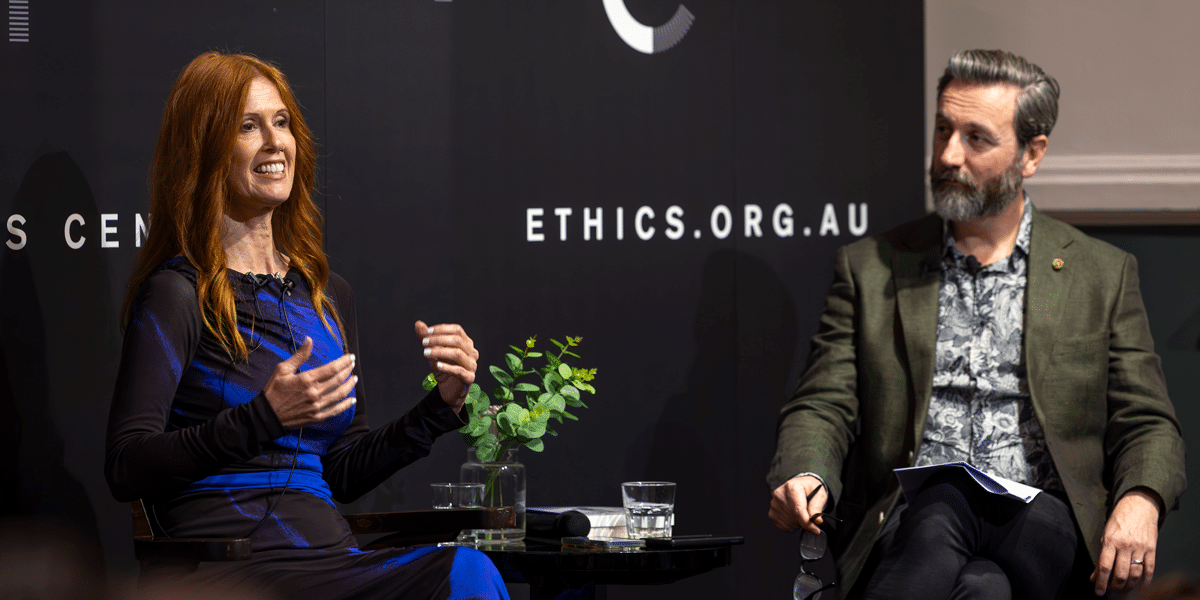
3 things we learnt from The Ethics of AI
Opinion + AnalysisScience + TechnologyBusiness + Leadership
BY The Ethics Centre 17 SEP 2025
As artificial intelligence is becoming increasingly accessible and integrated into our daily lives, what responsibilities do we bear when engaging with and designing this technology? Is it just a tool? Will it take our jobs? In The Ethics of AI, philosopher Dr Tim Dean and global ethicist and trailblazer in AI, Dr Catriona Wallace, sat down to explore the ethical challenges posed by this rapidly evolving technology and its costs on both a global and personal level.
Missed the session? No worries, we’ve got you covered. Here are 3 things we learnt from the event, The Ethics of AI:
We need to think about AI in a way we haven’t thought about other tools or technology
In 2023, The CEO of Google, Sundar Pichai described AI as more important than the invention of fire, claiming it even surpassed great leaps in technology such as electricity. Catriona takes this further, calling AI “a new species”, because “we don’t really know where it’s all going”.
So is AI just another tool, or an entirely new entity?
When AI is designed, it’s programmed with algorithms and fed with data. But as Catriona explains, AI begins to mirror users’ inputs and make autonomous decisions – often in ways even the original coders can’t fully explain.
Tim points out that we tend to think of technology instrumentally, as a value neutral tool at our disposal. But drawing from German philosopher Martin Heidegger, he reminds us that we’re already underthinking tools and what they can do – tools have affordances, they shape our environment and steer our behaviour. So “when we add in this idea of agency and intentionality” Tim says, “it’s no longer the fusion of you and the tool having intentionality – the tool itself might have its own intentions, goals and interests”.
AI will force us to reevaluate our relationship with work
The 2025 Future of Jobs Report from The World Economic Forum estimates that by 2030, AI will replace 92 million current jobs but 170 million new jobs will be created. While we’ve already seen this kind of displacement during technological revolutions, Catriona warns that the unemployed workers most likely won’t be retrained into the new roles.
“We’re looking at mass unemployment for front line entry-level positions which is a real problem.”
A universal basic income might be necessary to alleviate the effects of automation-driven unemployment.
So if we all were to receive a foundational payment, what does the world look like when we’re liberated from work? Since many of us tie our identity to our jobs and what we do, who are we if we find fulfilment in other types of meaning?
Tim explains, “work is often viewed as paid employment, and we know – particularly women – that not all work is paid, recognised or acknowledged. Anyone who has a hobby knows that some work can be deeply meaningful, particularly if you have no expectation of being paid”.
Catriona agrees, “done well, AI could free us from the tie to labour that we’ve had for so long, and allow a freedom for leisure, philosophy, art, creativity, supporting others, caring for loving, and connection to nature”.
Tech companies have a responsibility to embed human-centred values at their core
From harmful health advice to fabricating vital information, the implications of AI hallucinations have been widely reported.
The Responsible AI Index reveals a huge disconnect between businesses leaders’ understanding of AI ethics, with only 30% of organisations knowing how to implement ethical and responsible AI. Catriona explains this is a problem because “if we can’t create an AI agent or tool that is always going to make ethical recommendations, then when an AI tool makes a decision, there will always be somebody who’s held accountable”.
She points out that within organisations, executives, investors, and directors often don’t understand ethics deeply and pass decision making down to engineers and coders — who then have to draw the ethical lines. “It can’t just be a top-down approach; we have to be training everybody in the organisation.”
So what can businesses do?
AI must be carefully designed with purpose, developed to be ethical and regulated responsibly. The Ethics Centre’s Ethical by Design framework can guide the development of any kind of technology to ensure it conforms to essential ethical standards. This framework can be used by those developing AI, by governments to guide AI regulation, and by the general public as a benchmark to assess whether AI conforms to the ethical standards they have every right to expect.
The Ethics of AI can be streamed On Demand until 25 September, book your ticket here. For a deeper dive into AI, visit our range of articles here.

BY The Ethics Centre
The Ethics Centre is a not-for-profit organisation developing innovative programs, services and experiences, designed to bring ethics to the centre of professional and personal life.
Ethics in your inbox.
Get the latest inspiration, intelligence, events & more.
By signing up you agree to our privacy policy
You might be interested in…
Opinion + Analysis
Relationships, Science + Technology
We are being saturated by knowledge. How much is too much?
Opinion + Analysis
Business + Leadership
If it’s not illegal, should you stop it?
WATCH
Business + Leadership, Climate + Environment, Science + Technology
How to build good technology
Opinion + Analysis
Business + Leadership, Relationships




